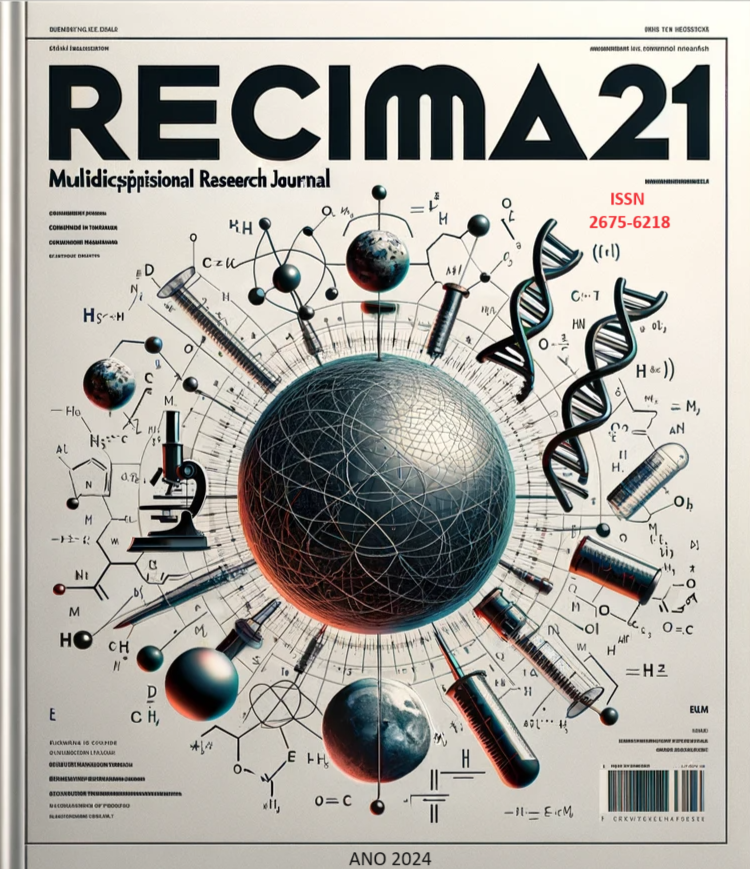CORRECTION OF NEGATIVE EXTERNALITIES RESULTANT OF NATURAL RESOURCE EXPLORATION IN BELIZE, ANGOLA
DOI:
https://doi.org/10.47820/recima21.v5i8.4106Keywords:
current article has as theme “Correction of negativeAbstract
The current article has as theme “Correction of negative externalities resultant of natural resource exploration in Belize, and to guide the work it was made the following scientific question: how to correct the negative externalities resultant of natural resources exploration in Belize? Through the theoretical boarding that elucidate about externalities and its respective ways of correction, and through the exploratory research, it is admissible as hypothesis that, to correct the negative externalities resultant of natural resources exploration in Belize, the governor must adopt police measures, binding limits in natural resources exploration; actuate market instruments taxing the companies according to the adverse effect caused and create a propitious environment so that the companies may correct negative externalities by bargaining between them and the parts affected by adverse effect caused by them. The goal of this article is to propound measures for the correction of negative externalities resultant of natural resources exploration in the region in study. For that, hypothetical-deductive and statistical methods were used. For the data collection, questionnaire, a structured interview, documentary analysis and observation were used. According to what was found, for the correction of negative externalities in region in study, it is propounded that the governor materialize the forest resupplying actions, create the figure of woodman, build roads according to the kind of vehicles that circulate in the region even pike and create incentives so that the companies adopt actions of social responsibility.
Downloads
References
BRANCO, Castel C. Indústrias de Recursos Naturais e Desenvolvimento: alguns comentários. [S. l.]: IESE, 2009. (IDEIAS nº10). Disponível em: http//www.iese.ac.mz/lib/publication/outras. Acesso em: 10 out. 2020.
COSTA, Erizalva das Dores P. José. A Exploração de Recursos Naturais e a Preservação Ambiental: O caso de São Tomé e Príncipe. 2014. 68f. Dissertação (Mestrado em Economia e Gestão do Ambiente) – Universidade do Porto, Faculdade de Economia, Porto, 2014.
DULLEY, Richard Domingues. Noção de Natureza, Ambiente, Meio Ambiente, Recursos Ambientais e Recursos Naturais. CCTC, n. ASP, p. 22, out. 2004.
GUIMARÃES, Bernardo; GONÇALVES, Carlos Eduardo. Introdução á Economia. São Paulo: Elsevier Editora, 2010.
MANKIW, N. Gregory, Princípios de Microeconomia. 3. ed. São Paulo: Thomson Learning, 2007.
PINDYCK, Robert S.; RUBINFELD, Daniel L. Microeconomia. 8. ed. São Paulo: Pearson Education, 2014.
PRODANOV, Cleber Cristiano; FREITAS, Ernani Cesar. Metodologia do Trabalho Científico: Métodos e Técnicas da Pesquisa e do Trabalho Académico. 2. ed. Novo Hamburgo: Feevale, 2013.
REPÚBLICA DE ANGOLA. Auditorias Ambientais, Assembleia Nacional. Lei nº1/10. Diário da República, 13 de Janeiro de 2010.
REPÚBLICA DE ANGOLA. Avaliação de impacte ambiental. ____. Lei nº51/04. Diário da República, 23 de Julho de 2004.
REPÚBLICA DE ANGOLA. Código Mineiro. _____. Lei nº31/11. Diário da República, 23 de Setembro de 2011.
REPÚBLICA DE ANGOLA. Lei de Bases de Florestas e Fauna Selvagem. ____. Lei nº6/17. Diário da República, 24 de Janeiro de 2017.
REPÚBLICA DE ANGOLA. Lei de Bases do Ambiente. ______. Lei nº5/98. Diário da República, 19 de Junho de 1998.
REPÚBLICA DE ANGOLA. Licenciamento Ambiental. _______. Lei nº59/07. Diário da República, 13 de Julho de 2007.
REPÚBLICA DE ANGOLA. Regulamento Florestal. _____. Lei nº171/18. Diário da República, 23 de Julho de 2007.
RODRIGUES, JOSÉ LUÍS AZEVEDO. Conceção de pavimentos rígidos. 2011. Dissertação (Mestrado em Engenharia Civil-especialização em Vias de Comunicação) – Universidade do Porto, Faculdade de Engenharia, Porto, 2011.
SAMUELSON, Paul A.; NORDHAUS, William D. Economia. 19. ed. Lisboa: McGraw-Hill, 2011.
SENHORAS, Elói Martins; MOREIRA, Fabiano; VITTE, Claudete de Castro Silva. A agenda exploratória de recursos naturais na América do Sul: da empírea à teorização geoestratégica de assimetrias nas relações internacionais. [S. l.: s. n.], 2009. Disponível em http://works.bepress.com/cgi/viewcontent.cgi?article=1122&context=eloi. Acesso em: 10 out. 2020.
SOARES, Emília Salgado. Externalidades Negativas e seus Impactos no Mercado. 1999. 90f. Dissertação (Mestrado em Planeamento e Finanças Públicas) – EAESPIFGV, São Paulo, 1999.
TAMO, Kiamvu. Fundamentos da Responsabilidade Social da Empresa. Luanda: Capatê Publicações, 2009.
TAMO, Kiamvu. Metodologia de Investigação em Ciências Sociais. Luanda: Capatê Publicações, 2012.
Downloads
Published
How to Cite
License
Copyright (c) 2024 RECIMA21 - Revista Científica Multidisciplinar - ISSN 2675-6218

This work is licensed under a Creative Commons Attribution 4.0 International License.
Os direitos autorais dos artigos/resenhas/TCCs publicados pertecem à revista RECIMA21, e seguem o padrão Creative Commons (CC BY 4.0), permitindo a cópia ou reprodução, desde que cite a fonte e respeite os direitos dos autores e contenham menção aos mesmos nos créditos. Toda e qualquer obra publicada na revista, seu conteúdo é de responsabilidade dos autores, cabendo a RECIMA21 apenas ser o veículo de divulgação, seguindo os padrões nacionais e internacionais de publicação.


 Clique para ver detalhes
Clique para ver detalhes 









